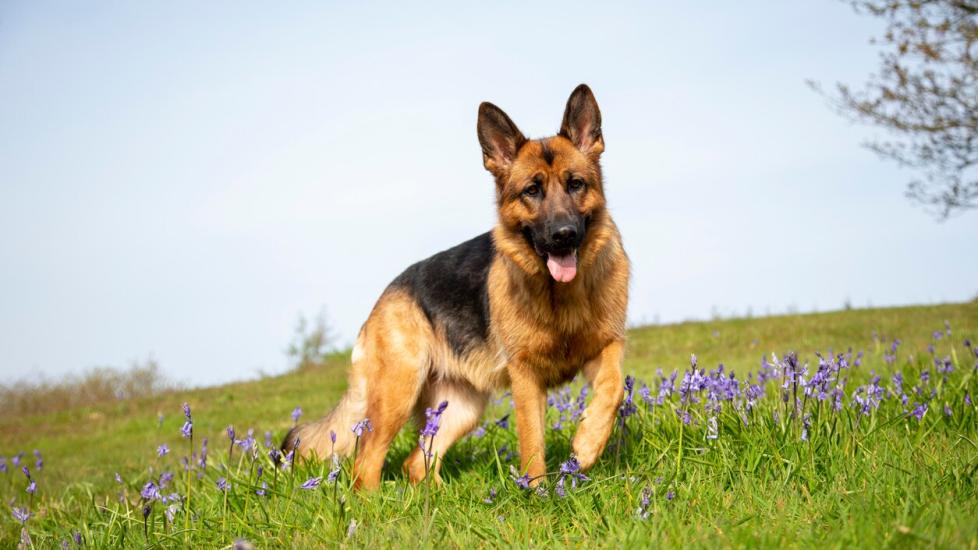German Shepherd
Adobe Stock/SashaFoxWalters
German Shepherds are large, agile, muscular, highly intelligent, and loyal dogs. These attributes make them one of the most popular dog breeds in the U.S.
As part of the herding group, German Shepherds are high-energy and love having a job or an outlet for regular exercise. They are known for their confidence and bravery, as well as their ability to thrive with expert levels of dog training and obedience. In fact, German Shepherds are commonly used as working dogs in the military and police for patrolling, bomb sniffing, and search and rescue.
This large dog breed has an average weight ranging from 50–90 pounds. They are typically 22–26 inches tall.
Caring for a German Shepherd
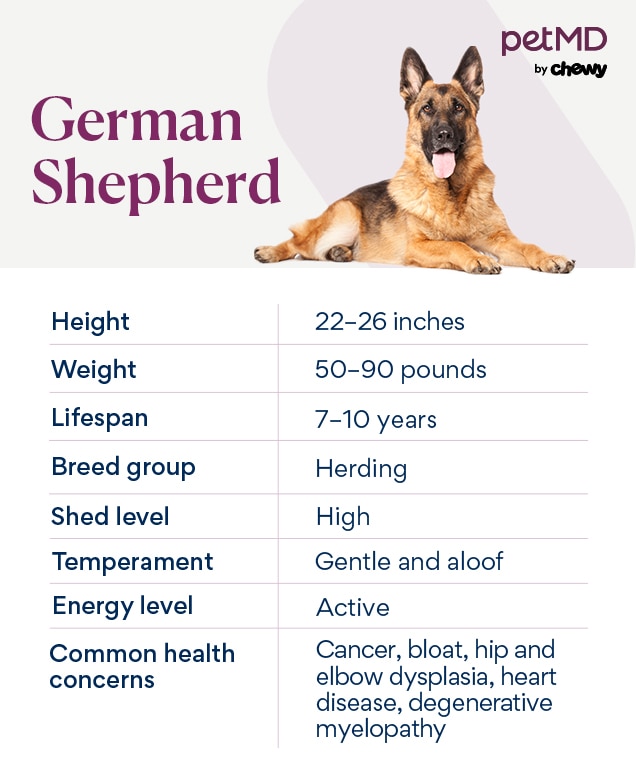
German Shepherd dogs are incredibly active and require training and regular exercise to keep them out of trouble. They are best for active families and experienced pet parents who can handle their energy level.
It also helps if pet parents understand how to socialize a puppy. Socialization, along with consistent training, is essential for German Shepherd puppies so they grow into confident and well-mannered dogs.
How Much Exercise Does a German Shepherd Need?
German Shepherds are an active and athletic breed that require one to two hours of exercise every day for their physical and mental health. Without ample exercise and mental stimulation, they will develop unfavorable behaviors due to irritation and pent-up energy.
Do German Shepherds Shed a Lot?
German Shepherds have a double coat that sheds a lot. They will also typically go through two periods of excessive shedding each year (in the spring and fall), when extra grooming is required.
German Shepherd Temperament and Personality
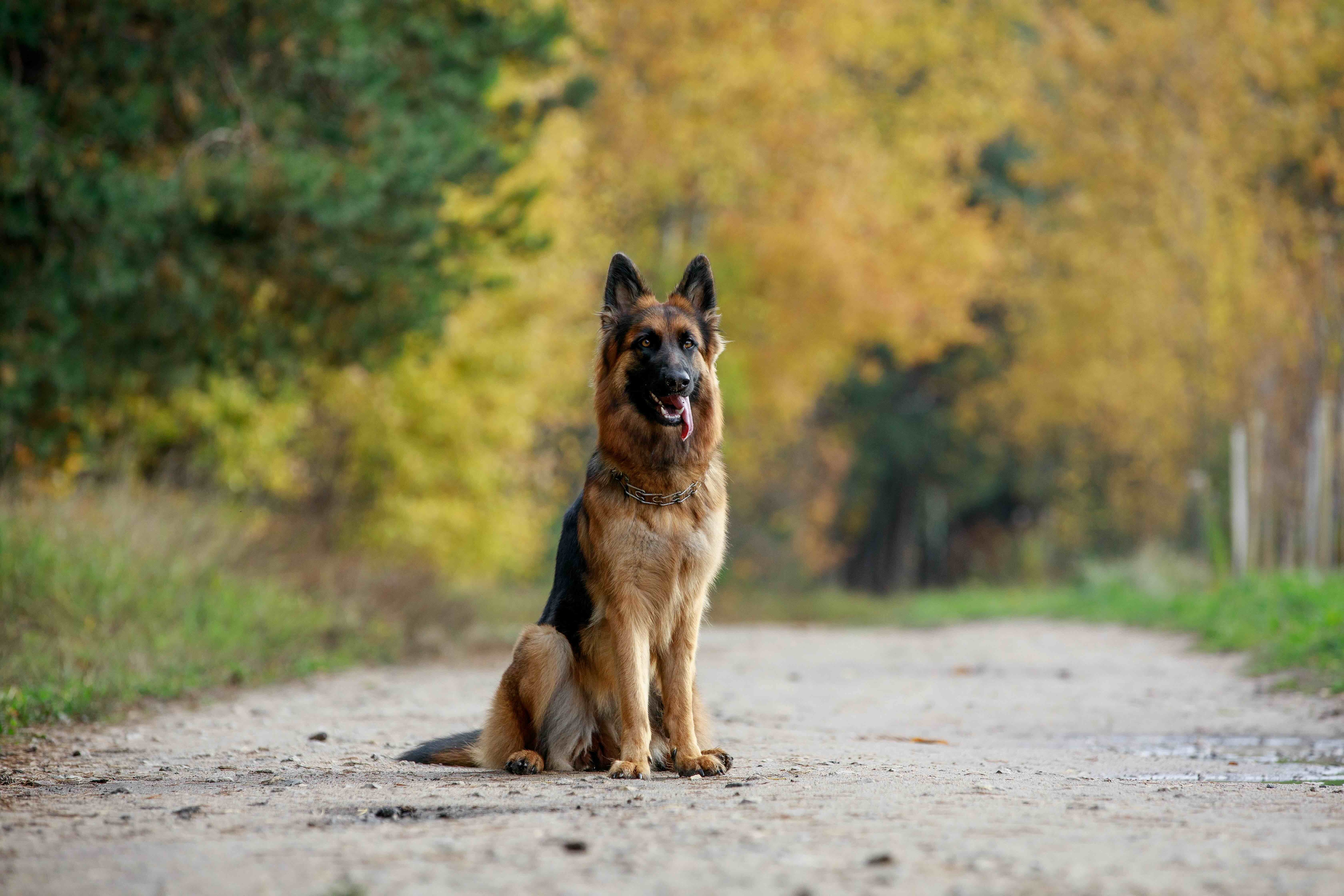
The German Shepherd temperament varies by individual, as breed only makes up about 9% of a dog’s behavior.
But with their history as herders and guardians, you can expect your German Shepherd to be a loyal and alert dog. They are known to be gentle around their family but may be reserved around strangers.
Are German Shepherds Good With Kids?
Yes, German Shepherds are good with kids if they are appropriately trained and well-socialized. It’s equally as important that children are taught the appropriate ways to engage with dogs.
Make sure all interactions between dogs and kids are supervised.
Training and Behavior Tips for German Shepherds
Because of their historical roots, German Shepherds have a strong drive and should be kept on a leash or inside a fenced-in yard at all times when outside. Otherwise, they may dart after a squirrel, rabbit, or cat.
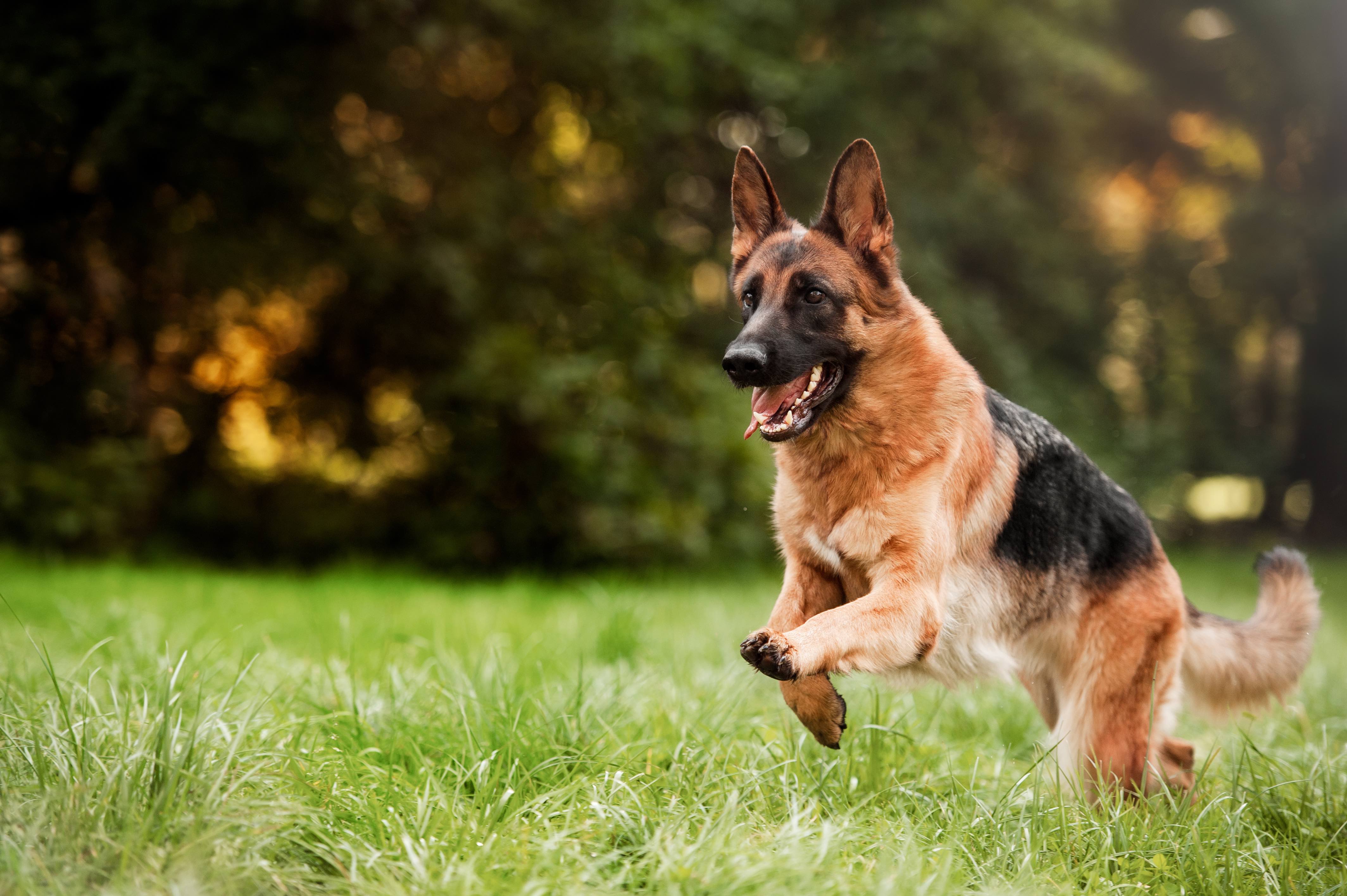
It’s crucial to start socializing your new German Shepherd puppy with other dogs and have them enrolled in obedience training classes. This helps you build the right foundation for your puppy to evolve into a well-adapted and well-mannered adult dog.
Are German Shepherds Easy to Train?
As one of the most smartest dog breeds, German Shepherds thrive on consistency, positive reinforcement, and a reward system, such as treats or toys to help strengthen the human-animal bond.
But because of their energy and intelligence, this breed might be a better fit for experienced dog parents who have experience training dogs. Don’t hesitate to reach out to a certified dog trainer for extra help, if needed.
What Are Fun Activities for German Shepherds?
-
Herding
-
Tracking
German Shepherd Health Issues
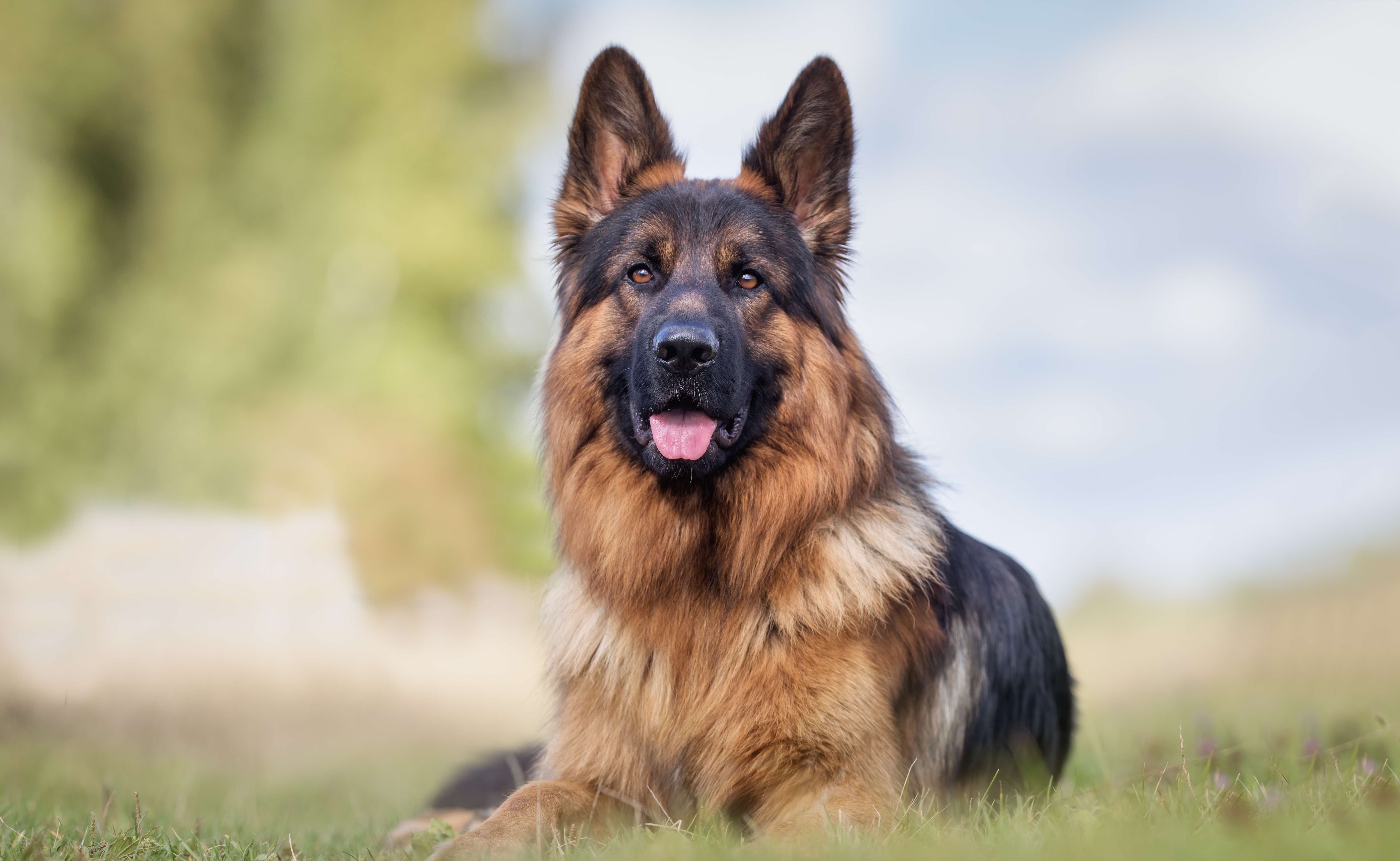
The average German Shepherd lifespan is 7–10 years, and they are prone to several health problems. Purchasing pet insurance for your dog may be a smart investment when you bring home a German Shepherd puppy.
Reputable German Shepherd breeders will screen their dogs for genetic conditions before breeding. If you’re adopting through a German Shepherd rescue or local shelter, ask for all available health information on your dog.
Degenerative Myelopathy
Degenerative myelopathy is a neurologic disorder that affects the spinal cord, slowly causing paralysis of the back legs. Early signs of degenerative myelopathy include weakness in the hind end and difficulty standing up.
There’s no treatment for this condition, but physical therapy can help strengthen muscles and protect a dog’s ability to use their legs.
Elbow and Hip Dysplasia
Elbow dysplasia is a degenerative joint disease that can cause lifelong pain in the front limbs. Hip dysplasia is another degenerative joint disease that affects the hind end.
According to the Canine Health Information Center, about 20% of German Shepherds have hip dysplasia. Clinical signs of both conditions include limping, decreased range of motion, and other signs of pain—especially later in life, as arthritis sets in because of this disease process.
The treatment for all degenerative joint diseases includes weight loss, reduced activity, joint supplements, anti-inflammatory and pain medications, or surgery.
There is testing available, such as the PennHIP, that can predict your German Shepherd’s risk of developing dysplasia during their lifetime.
Cancer
Cancer can develop in German Shepherds at any age, but it usually occurs later in life. Common cancers include:
-
Hemangiosarcoma (a malignant tumor most often detected in blood-rich organs such as the spleen and the heart)
-
Intestinal cancers
Depending on the extent of the cancer, treatment plans can include chemotherapy, radiation, surgery, or palliative care.
Bloat and Gastric Dilation-Volvulus
Gastric dilation-volvulus (GDV) is a sudden life-threatening condition when the stomach enlarges with gas (bloat) and then twists upon itself (GDV). This happens most commonly in deep-chested, large-breed dogs—including German Shepherds.
Pet parents must be aware of the signs of bloat and GDV, as this is a medical emergency and immediate medical intervention is key to saving your dog’s life. Take your dog to the vet immediately if you notice:
-
Distended stomach
-
Abdominal pain (ex. whining with or without touching their belly)
-
Restlessness/pacing
-
Retching without producing vomit (dry heaving)
-
Collapse
One way to help prevent your German Shepherd dog from developing life-threatening GDV is via a gastropexy procedure, when the stomach is permanently attached to the body wall. This prevents the stomach from twisting, and it’s often done during a dog’s spay or neuter surgery.
Allergies
Allergies in German Shepherds can be first seen with symptoms such as itchy skin, skin infections, ear infections, or digestive upset such as vomiting, diarrhea, or weight loss.
A thorough medical history, physical examination, diagnostic testing of skin and ears, blood work, and fecal tests may be recommended if you suspect that your dog has allergies.
Heart Disease
Heart disease, specifically dilated cardiomyopathy (DCM), valvular disease, and heart murmurs, can be common in German Shepherds. It’s important to have your dog’s heart evaluated during their yearly physical exam.
The treatment plan for a dog diagnosed with heart disease typically includes medications that help increase the heart’s pumping ability and manage arrhythmias (irregular heartbeat). A special diet may also be considered to restrict sodium intake and increase the amount of certain amino acids that promote heart health.
Exocrine Pancreatic Insufficiency (EPI)
Exocrine pancreatic insufficiency (EPI) is a digestive health issue that occurs when the cells of the pancreas do not produce enzymes and hormones normally.
The most common symptom is weight loss, despite your pet having a ravenous appetite. Other symptoms of EPI include soft stools or diarrhea, excessive gas, the desire to eat feces and other unusual objects, flaky skin, or rough coat.
Unfortunately, there’s no cure for EPI in dogs. Once the pancreas is damaged to the point that symptoms of EPI develop, you must give your dog lifelong pancreatic enzyme supplements. But, with proper management, your dog can still live a happy life with this condition.
Pannus
Pannus, or superficial keratitis, is a painful eye condition that can cause blindness if not managed. It occurs more often in dogs that live at high altitudes, those with increased exposure to UV light, and in areas with severe air pollution.
Keeping your German Shepherd indoors during the sunniest part of the day, providing a shelter, or trying a specialty pair of dog goggles may be helpful in preventing this issue.
What To Feed a German Shepherd
German Shepherds require a high-quality, age-appropriate diet to meet their nutritional needs. These diets are usually labeled puppy, adult, or senior.
The Best Diet for German Shepherds
A large-breed puppy or adult food may be appropriate, and some brands even make dog food specifically for German Shepherd puppies and adults.
It’s highly recommended that all dogs eat a diet that meets the nutritional standards set by the Association of American Feed Control Officials (AAFCO). Basic vitamins and mineral supplements are typically not needed if your dog’s food is AAFCO-compliant.
Avoid offering your German Shepherd table scraps, as they can cause stomach upset. Human foods also have a much higher fat content than dog food and can cause pancreatitis and obesity.
How To Feed a German Shepherd
In general, German Shepherd puppies should be fed three to four times per day, and adult dogs should be fed twice a day. How much you feed is determined by the specific food your dog eats, as well as their lifestyle and health. Work with your veterinarian to determine how much food your dog should eat.
Talk to your veterinarian about when your German Shepherd puppy should switch to adult food. This typically happens when your dog is 12–18 months old.
To limit the risk of GDV, German Shepherds should not exercise for an hour before or after eating. Feeding smaller, frequent meals (instead of one big meal every day) will also help prevent bloat and GDV, as will using a slow-feeder bowl.
Nutritional Tips for German Shepherds
A dog eating an AAFCO-compliant diet will receive all the nutrients they need. But sometimes your vet might recommend supplementation, depending on your dog’s health.
Vets may recommend joint supplements or probiotics for your dog, such as Purina Calming Care or FortiFlora.
German Shepherd Grooming and Care Guide
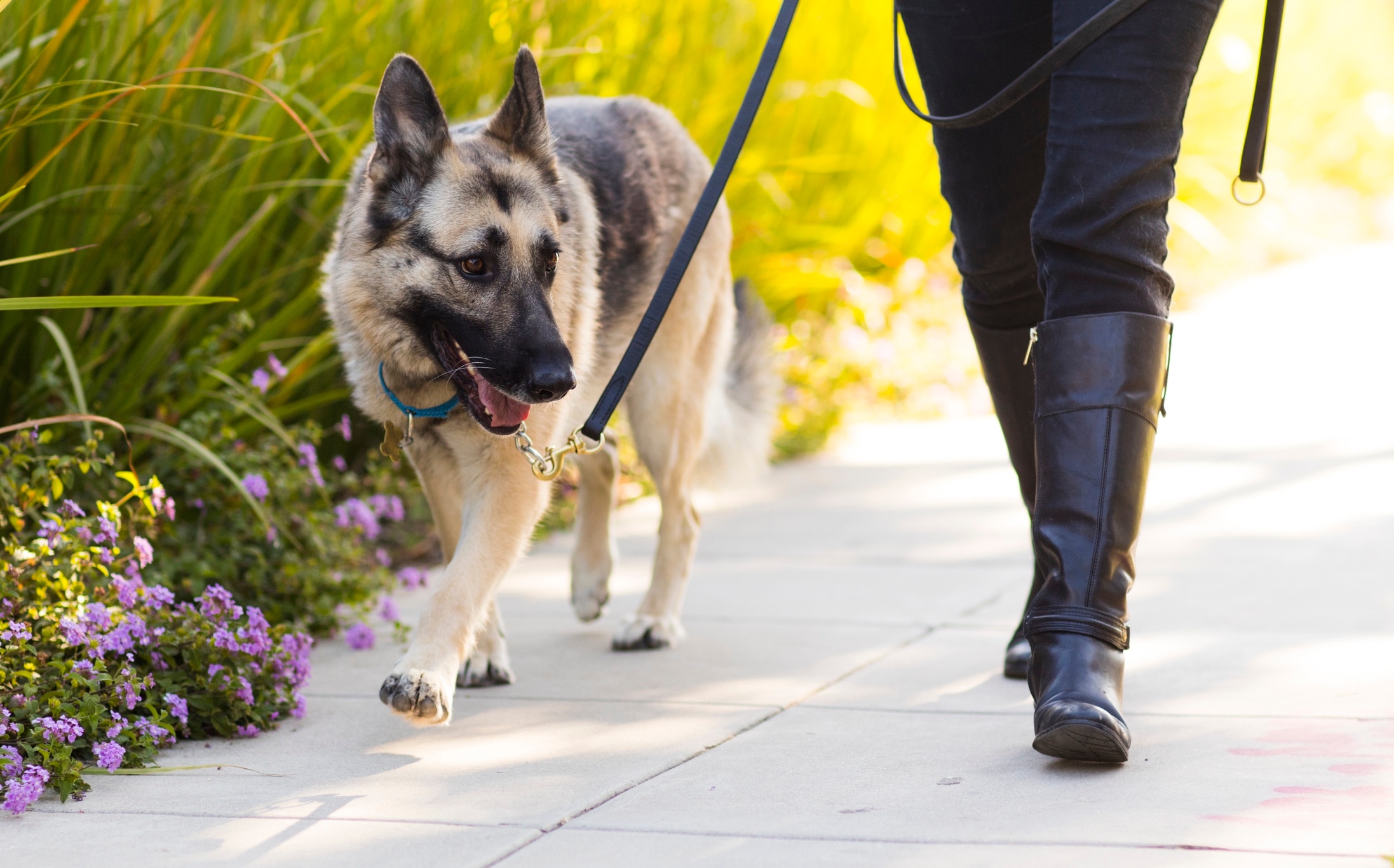
A German Shepherd’s undercoat is soft, yet the outer coat is tight, rough, and heavy. This breed sheds a lot and needs lots of at-home grooming.
Skin Care
German Shepherds only need a bath a few times a year. During their high-shedding periods (in the spring and fall), baths with dog shampoo can help decrease the hair around your home.
Excessive bathing should be avoided because it often strips the coat of its natural oils, which protect the skin and the undercoat.
Coat Care
Brush your dog every day with a pin brush. German Shepherds shed a lot, but frequent brushing can help reduce the amount of hair that ends up on your floor and furniture.
Eye Care
Because German Shepherds can be predisposed to eye issues, it’s important to monitor your dog’s eyes for changes. This is especially important if you live at a high altitude or where there’s a very high UV ray index.
Contact your vet if you notice changes in your dog’s eyes or vision.
Ear Care
While it’s important to keep your dog’s ears clean, ear cleanings should only be done if there is an issue or visible debris in the ear. Adding excessive moisture to a dog’s ear by bathing frequently, swimming, or using ear cleansing liquid too often can lead to bacterial growth and an ear infection.
Having a vet-recommended ear cleaner on hand is a great way to help keep your dog’s ears clean and healthy.
Nail Care
Making sure that a German Shepherd has regular nail trims is also important, unless their daily exercise routine wears the claws down naturally. When nails become overgrown, they are prone to breaking.
Considerations for Pet Parents
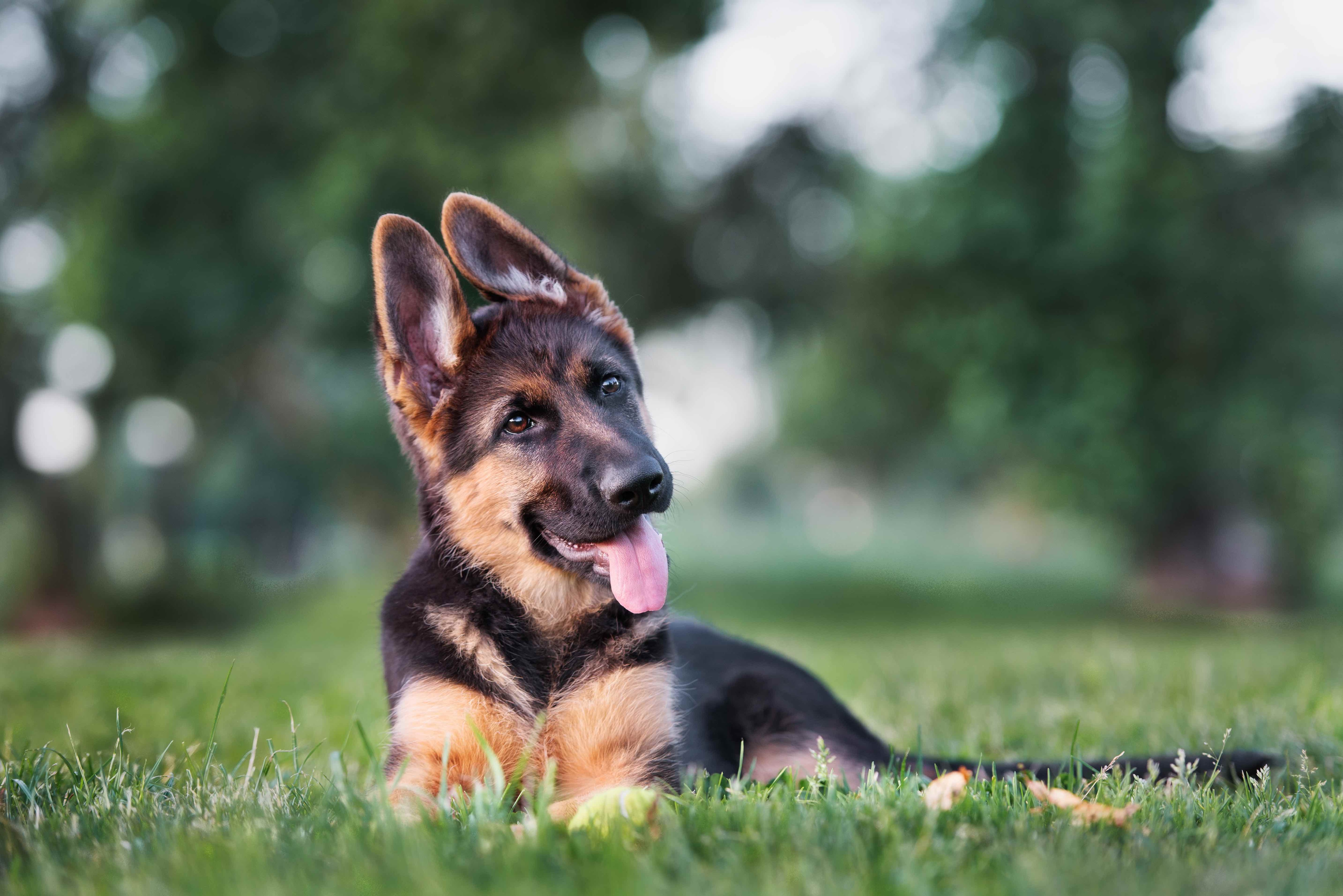
Bringing home a German Shepherd puppy is a seven- to 10-year commitment, so make sure you can give this active and intelligent dog the home they need. Pet parents must dedicate time to socialization and consistent training throughout their dog's life, along with keeping up daily exercise, near-daily grooming, and annual wellness exams.
German Shepherd FAQs
Are German Shepherds hypoallergenic?
No, German Shepherds are not considered hypoallergenic dogs. They shed heavily year-round.
Are German Shepherds smart dogs?
Yes, German Shepherds are considered to be one of the smartest dog breeds.
How long do German Shepherds live?
The average German Shepherd lifespan is 7–10 years.
How much is a German Shepherd?
The price of a German Shepherd can range from $2,000–$4,000 from a reputable breeder. But you can also find adoptable German Shepherds and German Shepherd mixes through local shelters and rescues.
How big do German Shepherds get?
The German Shepherd size varies by sex. Males stand 24–26 inches tall and weigh 65–90 pounds. Female German Shepherds are smaller, at 22–24 inches and 50–70 pounds.
What’s the difference between a Belgian Malinois vs. a German Shepherd?
German Shepherds and Belgian Malinois look similar, are working dogs, and are highly intelligent. But they are separate breeds, and there are many differences between German Shepherds and Belgian Malinois.
Belgian Malinois are smaller (40–80 pounds), while the average German Shepherd weight is 50–90 pounds. German Shepherds also have longer fur and a stockier build than Belgians.
